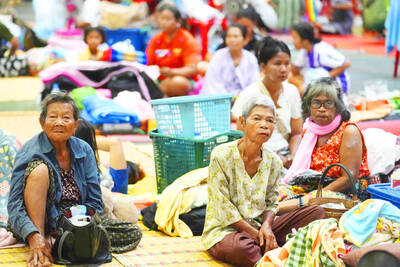Cuba has abandoned its egalitarian wage system to try to salvage its moribund economy, marking another step away from former president Fidel Castro's socialist dream.
The government consigned a decades-old ideological pillar to history by eliminating caps on salaries and promising to pay productive workers more than lazy or inefficient ones.
Carlos Mateu, the vice-minister of labor and social security, said many state enterprises, which comprise 90 percent of the economy, had already introduced the changes, and the rest would be completed by August.
The announcement, made on Wednesday in the Communist party newspaper Granma, sounded an official, low-key death knell of the “new socialist man,” a noble if elusive creature willing to work hard indefinitely without material incentives.
Mateu “underscored that there has been a tendency for everyone to get the same, and that egalitarianism is not convenient,” said the newspaper.
Workers will receive bonuses of up to 5 percent of their salary for meeting production quotas, which are typically modest, and possibly more if they exceed them. Managers may receive up to a 30 percent wage increase for improved performance. Wages will vary “according to the nature of the labor performed by the worker”, said the minister.
Almost half a century after the revolution, Cuba boasts free universal education and healthcare, but the island is impoverished. Average state salaries of just US$19.50 a month leave people struggling to buy decent food, let alone luxuries such as soap.
Productivity in the state sector is extremely low.
“They pretend to pay us, we pretend to work. It’s an old joke but it still applies,” said Marta, a 45-year-old writer for radio programs.
Officially, unemployment is just 1.9 percent, but it is no secret that millions of Cubans are underemployed or idle, few seeing the point of laboring for a pittance. The black market, a source of foreign currency, hums with diligence and ingenuity.
Raul Castro, who succeeded his ailing older brother Fidel as president in February, has identified economic inefficiency and low living standards as threats to the revolution’s continuity. He has studied China and Vietnam as models of how a communist party can retain political control while liberalizing the economy.
The 77-year-old has approved a series of small reforms — lifting restrictions on renting cars, staying in luxury hotels and owning computers and mobile phones — which signal tolerance for inequality.
The disparity is not new, but the better off are now flashier. They cruise Havana in new cars and cart home electronic goods like trophies.
Raul has tweaked Karl Marx’s famous maxim — “From each according to his ability, to each according to his need” — to emphasize a more goal-oriented socialism: “From each according to his ability, to each according to his work.”
Since being sidelined with an intestinal illness two years ago, the 81-year-old communist leader has vanished from public view. Since formally ceding power to his brother his behind-the-scenes influence appears to have significantly waned.

FOREST SITE: A rescue helicopter spotted the burning fuselage of the plane in a forested area, with rescue personnel saying they saw no evidence of survivors A passenger plane carrying nearly 50 people crashed yesterday in a remote spot in Russia’s far eastern region of Amur, with no immediate signs of survivors, authorities said. The aircraft, a twin-propeller Antonov-24 operated by Angara Airlines, was headed to the town of Tynda from the city of Blagoveshchensk when it disappeared from radar at about 1pm. A rescue helicopter later spotted the burning fuselage of the plane on a forested mountain slope about 16km from Tynda. Videos published by Russian investigators showed what appeared to be columns of smoke billowing from the wreckage of the plane in a dense, forested area. Rescuers in

‘ARBITRARY’ CASE: Former DR Congo president Joseph Kabila has maintained his innocence and called the country’s courts an instrument of oppression Former Democratic Republic of the Congo (DR Congo) president Joseph Kabila went on trial in absentia on Friday on charges including treason over alleged support for Rwanda-backed militants, an AFP reporter at the court said. Kabila, who has lived outside the DR Congo for two years, stands accused at a military court of plotting to overthrow the government of Congolese President Felix Tshisekedi — a charge that could yield a death sentence. He also faces charges including homicide, torture and rape linked to the anti-government force M23, the charge sheet said. Other charges include “taking part in an insurrection movement,” “crime against the

POINTING FINGERS: The two countries have accused each other of firing first, with Bangkok accusing Phnom Penh of targeting civilian infrastructure, including a hospital Thai acting Prime Minister Phumtham Wechayachai yesterday warned that cross-border clashes with Cambodia that have uprooted more than 130,000 people “could develop into war,” as the countries traded deadly strikes for a second day. A long-running border dispute erupted into intense fighting with jets, artillery, tanks and ground troops on Thursday, and the UN Security Council was set to hold an emergency meeting on the crisis yesterday. A steady thump of artillery strikes could be heard from the Cambodian side of the border, where the province of Oddar Meanchey reported that one civilian — a 70-year-old man — had been killed and

Philippine President Ferdinand Marcos Jr is to meet US President Donald Trump this week, hoping Manila’s status as a key Asian ally would secure a more favorable trade deal before the deadline on Friday next week. Marcos would be the first Southeast Asian leader to meet Trump in his second term. Trump has already struck trade deals with two of Manila’s regional partners, Vietnam and Indonesia, driving tough bargains in trade talks even with close allies that Washington needs to keep onside in its strategic rivalry with China. “I expect our discussions to focus on security and defense, of course, but also